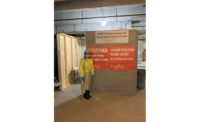COVID-19 and Construction
COVID-19 Delays, Closes Projects Across the Midwest
Reasons for project delays vary from statewide orders to loss of sales tax revenue or state financing

Construction has ground to a halt and led to delays and cancellations of projects in Midwestern states and elsewhere due to the COVID-19 pandemic.
For ENR’s latest coverage of the impacts of the COVID-19 pandemic, click here
Stay-at-home orders that do not deem construction projects essential work, safety concerns for workers, supply chain problems, rising municipal bond rates, and the tabling of state financing incentives have all put projects on hold. As of April 11, postponements and cancellations were on the rise, according to the Associated General Contractors of America.
For its weekly survey covering the week of March 30 through April 5, AGC Chief Economist Ken Simonson said 59% of 1,300 respondents indicated projects had been delayed or disrupted, up 45% from the previous week.
In addition, 55% said an owner had told them to halt or cancel work (up from 39% the previous week) and 35% said the most common reason for a delay or halt was a shortage of materials, equipment or parts (up from 23% the previous week).
Unessential Michigan
Barton Malow Co., a Detroit-based general contractor and construction manager, is coping with a statewide order that has shut down most construction in Michigan.
"Construction is not considered essential [infrastructure] in Michigan so we've had to halt progress on more than 100 projects," said Dana Galvin Lancour, vice president of branding and communications for Barton Malow.
One of the company's most prominent delays is the $775-million, mixed-use development on the site of the former J.L. Hudson department store in downtown Detroit. The project calls for an 800-ft-tall tower with 1 million sq ft of residential, retail, office and public event space.
Another delayed project is the consolidated Wayne County Justice Complex. The complex planned with 2,280 jail beds, 25 courtrooms, five hearing rooms, sheriff's and prosecutor's offices, and a 160-bed juvenile detention facility has been indefinitely postponed.
Project delays are not only limited to Michigan where many projects don’t qualify as necessary under Gov. Gretchen Whitmer's [D] stay-at-home order, the only one of its kind in the Midwest.
Way Up North
Husky Energy's Superior Rebuild Project, which entails the modernization and rebuild of an asphalt, gasoline and diesel production facility in the Superior-Duluth region of both Wisconsin and Minnesota, has also been put on hold to protect the health and safety of workers, said Graham White, contract communications advisor for Husky.
"We've been monitoring the rapidly evolving COVID-19 situation, and closely following the advice and direction of health authorities. At this time, the best course of action is to suspend the work," White said in a statement.
No date for project resumption has been set. White said a decision will be made in consultation with local contractors and labor unions working on the rebuild.
Ohio Tightens the Purse Strings
State incentives for a project in Ohio are now are less robust as the state is tightening its belt on all spending because of the pandemic. Ohio has pulled back on plans to extend $70 million in state incentives to The Sherwin-Williams Company for construction of a new Cleveland headquarters and for a new research and development center in Brecksville.
The Ohio Controlling Board, a legislative panel that approves spending requests, had been slated in March to approve interest-free loans to the company for construction of the $350.3-million headquarters and the $280.4-million research center.
On March 23, Gov. Mike DeWine [R] ordered a statewide hiring freeze, directed state agencies to consider spending cuts of up to 20%, and put a hold on new spending requests that required legislative approval, such as the Sherwin-Williams projects.
"We've had some state incentives that aren't being heard. They're not considering those at this time," said Todd Walker, a spokesperson for the Ohio Development Services Agency.
Julie Young, vice president of Global Corporate Communications for Sherwin-Williams, said the company still expects the project to go forward eventually.
“During the COVID-19 pandemic, spending related to the Sherwin-Williams new global headquarters and new R&D center is paused, near term, as the company focuses on the health and safety of our employees, customers and communities," she said in an emailed statement. "The most critical planning activities for the project will continue, though at a slower pace. We will continue to work with state and local partners and look forward to finalizing the remaining economic development package agreements."
She said the company's reasons for wanting to build a new headquarters and R&D center have not changed.
"Sherwin-Williams operates out of a 90-year old headquarters building that is no longer able to meet the needs of our 21st century, growing workforce," she said.
A transition to the new facilities is not expected to take place until 2023 at the earliest, she said.
Public Projects Put Into Postponement
Meanwhile, financing of the $420-million Wisconsin Center in Milwaukee, the state’s largest convention center, has been put on hold because of uncertainty in the bond market and the loss of sales tax revenue in the travel and hospitality industries that have been devastated by COVID-19.
Issuance of bonds for the project, which will double the size of the convention center and allow it to hold several conventions simultaneously, had been tentatively set for April 21.
The Wisconsin Development Center board approved a resolution April 2 authorizing the district to move forward with the expansion, but to wait for a more opportune time for a bond sale. Bonds to fund the expansion will not be issued until the board's governance committee receives an updated tax projection analysis and financial package.
"We do not yet know when the market will rebound enough for us to issue the bonds, but the approval of our board on April 2 has empowered us to keep moving forward to be market ready when the day does come," said Sarah Maio, vice president of marketing and communications for the Wisconsin Center District.
It is estimated that the expansion project will create 1,150 construction jobs and more than $100 million in direct labor wages during construction when it starts. The Wisconsin Center is slated to be the site of the Democratic Convention, now delayed until August.
"We've had $90 million in projects that have hit pause," Kevin Byrd, vice president of operations for Central Texas for Bartlett Cocke General Contractors, a top school construction contractor said.
Byrd said supply chain issues are the reason many of these school projects are being put off, and that's an especially troublesome problem for time-sensitive projects such as construction or renovations at schools that take place over the summer and need to be done before classes resume. He also said his project managers were using a Google doc to keep track of supply chain issues and that had 34 items as of April 3. One glass supplier Bartlett Cocke often uses has gone out of business as a result of a stay at home order.
"For the first time in years we've had teams on the bench," Byrd said.
Even as projects are delayed or canceled, contractors are looking for ways to continue to move work forward.
Galvin-Lancour said Barton Malow Co., is using the down time to train workers in areas such as project management certification and technology and to prepare to get up and running quickly after the pandemic passes.
"We're really focused on learning and development right now," she said. "We’re encouraging our teams to get trained on technology and to be focused on what remobilization will look like."
She expects the pandemic's effects on construction sites to be long-lasting.
"We really feel like this is going to be a much different world when we come back," she said.




